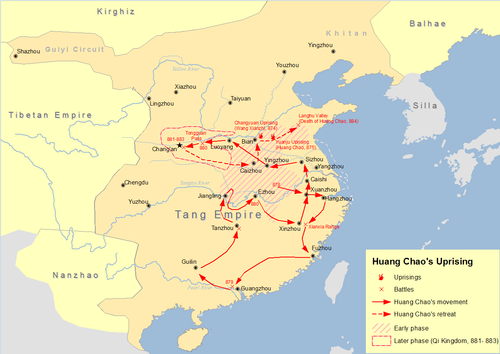Huang Chao
Huang proclaimed himself the Emperor of the Kingdom of Qi (齊國) and reigned on the imperial dragon throne for almost four years but was eventually defeated in battle by the rival Tang dynasty army led by the Shatuo chieftain Li Keyong in 883 and forced to desert and escape Chang'an.Following successive defeats, including to former subordinates Zhu Wen and Shang Rang who had surrendered to Tang, Huang was allegedly killed by his nephew Lin Yan, although the reports are inconclusive.The Tang dynasty recovered its power decades after the An Lushan rebellion and was still able to launch offensive conquests and campaigns like its destruction of the Uyghur Khaganate in Mongolia in 840–847.The discipline of these generals also decayed as their power increased, the resentment of common people against the incapacity of the government grew, and their grievances exploded into several rebellions during the mid-9th century.In 874, Wang Xianzhi (who, like Huang Chao, was a salt privateer) and Shang Junzhang (尚君長) raised an army at Changyuan (長垣, in modern Xinxiang, Henan).By 875, he had repeatedly defeated Xue Chong (薛崇), the military governor of Tianping Circuit (天平, headquartered in modern Tai'an, Shandong), in battle.However, Huang, who did not receive a commission as part of this arrangement, angrily stated:[6] "When we started the rebellion, we made a grand oath and we have marched through great distances with you.Huang, instead, claimed the title of Chongtian Dajiangjun (衝天大將軍, "Generalissimo Who Charges to the Heavens") and changed the era name to Wangba, to show independence from the Tang regime.However, during this march, he was attacked by the Tang officers Zhang Lin (張璘) and Liang Zuan (梁纘), who were subordinates of Gao Pian, the military governor of Zhenhai Circuit (鎭海, headquartered in modern Zhenjiang, Jiangsu), and was defeated several times.As a result of these battles, a number of Huang's followers, including Qin Yan, Bi Shiduo, Li Hanzhi, and Xu Qing (許勍), surrendered to the Zhenhai troops.He was, however, defeated by the joint forces of Shannan East's military governor Liu Jurong (劉巨容) and the imperial general Cao Quanzhen (曹全晸), who further pursued him all the way to Jiangling.Many circuits thus sent troops to Huainan[7] With his forces repeatedly defeated by Zhang and also suffering from plagues, Huang, then stationed at Xin Prefecture (信州, in modern Shangrao), decided to try to bribe his way out of his predicament.This occurred as some 3,000 Ganhua soldiers were heading to Yin River to participate in the defense operations there, and they went through Xu Prefecture (許州, in modern Xuchang), the capital of Zhongwu Circuit (忠武).Meanwhile, though, the chancellors Doulu Zhuan and Cui Hang, believing that imperial forces would not be able to stop Huang from reaching Luoyang and Chang'an, suggested that Emperor Xizong prepare to flee to Xichuan Circuit (西川, headquartered in modern Chengdu, Sichuan), where Chen Jingxuan, the brother of the powerful eunuch Tian Lingzi, was military governor.Emperor Xizong, however, wanted to also make one last attempt to defend Tong Pass, between Luoyang and Chang'an, and therefore sent the imperial Shence Army (神策軍) officers Zhang Chengfan (張承範), Wang Shihui (王師會), and Zhao Ke (趙珂)—whose soldiers were ill-trained and ill-equipped, as the Shence Army soldiers' families were largely wealthy and were able to pay the poor and the sick to fill in for them—to try to defend it.Meanwhile, Luoyang fell quickly, and Qi withdrew to Tong Pass as well, and submitted an emergency petition stating that his troops were fatigued, hungry, and without supplies, with no apparent imperial response.Meanwhile, Tian had recruited some new soldiers, who were also ill-trained but relatively well-equipped, and sent them to the front, but by the time they reached there, Tong Pass had already fallen, and the troops from Boye Army (博野軍) and Fengxiang Circuit (鳳翔, headquartered in modern Baoji, Shaanxi), also sent to the front to try to aid Zhang, became angry at the good equipment (including warm clothes) that Tian's new soldiers had, and mutinied, instead serving as guides for Huang's forces.He made his wife, Lady Cao, empress, while making Shang Rang, Zhao Zhang (趙璋), and the Tang officials Cui Qiu (崔璆) and Yang Xigu (楊希古) chancellors.By winter 882, Hua Prefecture also surrendered to Tang under the leadership of the officer Wang Yu (王遇), limiting Qi territory to Chang'an.[2][21] In spring 883, Li Keyong and the other Tang generals defeated a major Qi force (150,000 men) commanded by Shang and approached Chang'an.Shi Pu's officer Li Shiyue (李師悅), along with Shang, engaged Huang at Yan Prefecture and defeated him, annihilating nearly the remainder of his army, and he fled into Langhu Valley (狼虎谷, in modern Laiwu, Shandong).[21] (However, according to an alternative account in the New Book of Tang, Huang, believing that it was the only way that any of his army could be saved, committed suicide after instructing Lin to surrender with his head.It was noted that Langhu Valley was over 500 li or 3–4 days away on a horseback from Shi's camp in Xu Prefecture, and decomposition would have already kicked in during the hot summer to make the faces unrecognizable.The Song dynasty scholar Wang Mingqing (王明清), for example, alleged in his book Huizhu Lu: "When Zhang Quanyi was the mayor (留守) of the Western Capital (i.e. Luoyang), he recognized Huang Chao from among the monks.From the subsequent Song dynasty onwards, the political bureaucracy of China relied on more dispersed regional gentry clans who rose to prominence through the imperial civil service examination system.
Huang Chao (badminton)Chinese namefamily nameHuang Chao RebellionHuáng (黃)Given nameDynastyTraditional ChineseSimplified ChineseStandard MandarinHanyu PinyinWade–GilesHan ChineseEmperorKingdom of Qi (齊國)Tang dynasty militaryTang dynastysalt traderWang XianzhiGuangzhouChang'anEmperor Xizong of TangEmperor of the Kingdom of Qi (齊國)imperial dragon throneShatuoLi KeyongZhu WenShang RangAn Lushan RebellionAn LushanjiedushiYuanquMudan DistrictShandongimperial examinationsEmperor YizongXinxiangTai'anEmperor XizongchancellorWang DuoHuanggangMount ChayaZhumadianShangqiuBozhouKaifengPuyangPingdingshanXuchangLuoyangYangzi RiverGanzhouJiangxiJi'an, JiangxiShangraoXuanchengShaoxingZhejiangFuzhouGao PianZhenjiangQin YanBi ShiduoLi HanzhiLingnanJingzhouChangshaGuangdongYu Congcame to an endMaritime Silk RoadGuilinGuangxiXiang RiverTan PrefectureChangdeJianglingLiu HanhongXiangyangYangzhouChangzhiXuzhouBaodingMa'anshanChuzhouNanjingShaying RiverQi KerangJiningZhou JiHuai RiverDoulu ZhuanCui HangChen JingxuaneunuchTian LingziTong PassShaanxiZhang ZhifangLady CaoJiaozuoWang JingwuWeifangWang ChongrongYuncheng, ShanxiZheng TianWang ChucunTuoba SigongYulin, ShaanxiPingliangLi ChangyanWeinanQin ZongquanZhoukouZhao Chouusing them for foodShi PuTaiyuanYellow RiverZhengzhouNew Book of TangFive Dynasties and Ten Kingdoms periodBuddhist monkSong dynastyHuizhu Lu